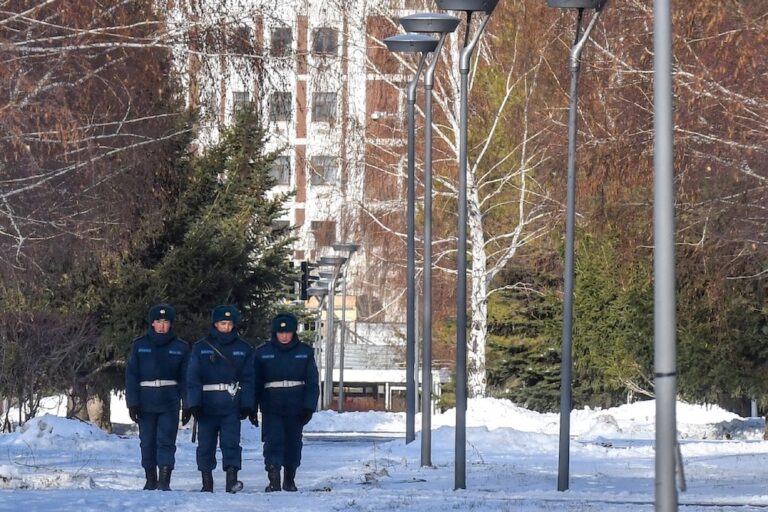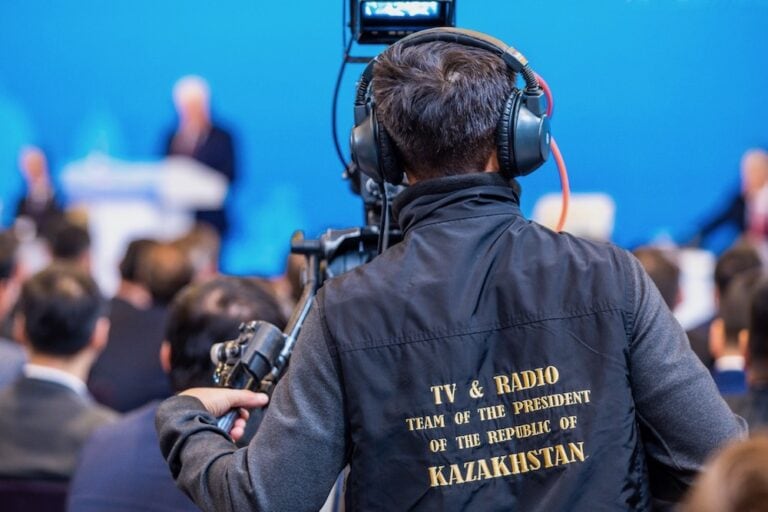(GDF/IFEX) – The following is a 19 October 1999 GDF press release: On the afternoon of Saturday 16 October 1999, following an order from Kazakhtelecom, the rebroadcasting of the Russian television station NTV by private commercial television stations in Kazakhstan was suspended. According to GDF’s information, the suspension order came via telephone. Commercial stations in […]
(GDF/IFEX) – The following is a 19 October 1999 GDF press release:
On the afternoon of Saturday 16 October 1999, following an order from
Kazakhtelecom, the rebroadcasting of the Russian television station NTV by
private commercial television stations in Kazakhstan was suspended.
According to GDF’s information, the suspension order came via telephone.
Commercial stations in Kostanai and Aktyubinsk informed GDF that
representatives of local
radio and TV broadcasting centres called the TV stations and referred to a
ruling given to them by telephone by a Kazakhtelecom “dispatcher” (local
broadcasting centres are state-owned).
Apparently, they decided to play it safe in Almaty. On Sunday 17 October, an
MMDS company of “Alma TV” stopped rebroadcasting all the Russian stations
which broadcast
newscasts. Alma-TV is partly Western-owned. The order to suspend
broadcasting of NTV in Kazakhstan was apparently provoked by a short
informative message making reference to the “New York Times”, which was
delivered on NTV’s news programme on 16 October. The director of the
“Segodnya” (Today) show explained that while investigating the issue of
money laundering in Western banks, Swiss investigators had discovered a bank
account for the “Credit Agricol Indoswets” bank, to which funds for
President Nazarbayev were transferred. (Please see more details at
http://www.ntv.ru.nday.16.htm ).
GDF believes that there is no need to comment on the NTV message. Kazakhstan
authorities should probably do that. In any civilized country, an official
reasonable answer should be given on similar statements. This is not the
first time that authorities demonstrate their inability to resolve
situations which are unfavorable to them in a civilized way.
The suspension of rebroadcasts of Russian stations as well as the imposition
of restrictions on broadcasting of private Kazakhstani TV stations provides
yet another reason to suppose that the following situation exists in
Kazakhstan:
1. “Telephone justice”, through which the authorities try to regulate the
information field in the country;
2. Censorship bodies that control mass media in both Kazakhstan and other
countries;
3. Arbitrariness of governing structures towards private broadcasting
stations of Kazakhstan. (In the case of this government order, private
stations found themselves in a complicated position since they lost their
source of programming and were forced to violate conditions of an agreement
with a Russian partner. Besides, suspension of NTV broadcasting means
significant losses for a number of private Kazakhstan stations, since they
violated obligations towards their advertisers);
4. Principles of the freedom of speech, mass information and democracy are
violated.
The desire of some officials to please the authorities (it would have been
hard to evaluate Kazakhtelecom’s actions differently) significantly damages
Kazakhstan’s international reputation and complicates the progress of
democratic reforms in the country. Besides, the real intention of Kazakhstan
is to broaden the common information space of NIS countries, not to impede
the wide exchange of information. The creation of favorable conditions for
private business development in the country are now in doubt.


